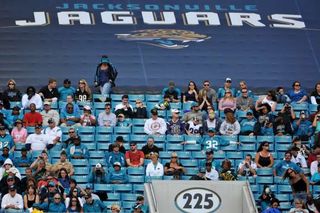Update: Sports Blackout Bill Introduced

A pair of powerful senators have introduced a bill, the Furthering Access and Networks for Sports Act, or FANS Act, that would remove the antitrust exemption for any sports league that does not prohibit or limit sports blackouts in their video contracts, including during retransmission-consent impasses.
The FCC two weeks ago under acting chairwoman Mignon Clyburn proposed to get rid of its sports blackout rule, but that would still leave leagues free to make blackouts part of their contracts.
So would the FANS Act, which is backed by Sens. John McCain (R-Ariz.) and Richard Blumenthal (D-Conn.), who has been working on the bill for a couple of months at least . But if MLB or the NFL or NBA or NHL opted to include blackouts, they would would lose the antitrust exemptions that allow them to collectively negotiate exclusive rights deals. Baseball has an even broader antitrust exemption.
Getting rid of the antitrust exemption during retrans blackouts is an effort to prevent must-have sports programming from being a bargaining chip in those negotiations.
Eliminating it for sports blackouts would mean that the NFL could no longer black out games in a home market if a game were not sold out (or in some cases mostly sold) 72 hours in advance. That was a way to insure that TV did not eat into ticket sales, but the bill’s authors suggest there is no longer evidence such blackouts drive fans to the ballparks.
The bill would also remove the exemption for any league that did not make games available over the Internet -- they could charge a fee-- where viewers could not access them over a TV station or MVPD.
Making them available over the Internet is primarily targeted at baseball, and MLB's policy of blacking out online access to games in a team's home territory, whether or not the fan can view the game on TV. The bill would require more targeted blackout policies, as the NFL and NBA have done.
Multichannel Newsletter
The smarter way to stay on top of the multichannel video marketplace. Sign up below.
“Special breaks should be stopped for professional sports leagues that impose anti-consumer blackout policies leaving their fans in the dark,"said Blumenthal in announcing the bill. "Leagues that enjoy antitrust exemptions and billions of dollars in subsidies and other benefits should give their fans fair access to their favorite teams on TV. This legislation would protect fans who now get the short end of the stick from leagues that treat the public with contempt while continuing to enjoy public benefits. Fans deserve to be put first – or at least treated fairly.”
“I am proud to join Senator Blumenthal to introduce the FANS Act, common-sense legislation that addresses archaic blackout policies and regulations that hurt sports fans around the country," said McCain. "While the FCC'S announcement last week that it would consider changes to the sports blackout rule is encouraging – and something we've urged in the past – legislation is still needed to improve this regulatory framework. The FANS Act would return the focus to the fans, consumers, and taxpayers who make these leagues as successful as they are.”
“Sports fans should not be treated like a fumbled pigskin every time there’s a fight between TV industry players," said David Goodfriend, chairman of the Sports Fans Coalition, which has been pushing Congress and the FCC to end sports blackouts. "The FANS Act would get the job done. The idea is simple: if you’re a sports league and you want to use the federal antitrust exemption, you have to prohibit your distributors from taking down games during their contract disputes."
The coalition recently saluted McCain and Blumenthal for being MVP's (Most Valuable Policymakers) when it comes to advocating for sports access issues.
Contributing editor John Eggerton has been an editor and/or writer on media regulation, legislation and policy for over four decades, including covering the FCC, FTC, Congress, the major media trade associations, and the federal courts. In addition to Multichannel News and Broadcasting + Cable, his work has appeared in Radio World, TV Technology, TV Fax, This Week in Consumer Electronics, Variety and the Encyclopedia Britannica.

